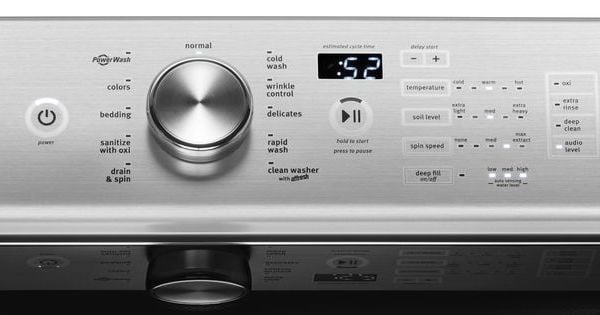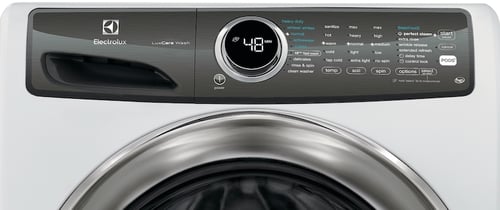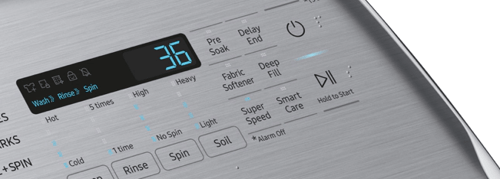
Time is valuable. If you're buying a new washer for the first time in a while and have heard about how today's washers take longer, or your last modern washer turned out to take forever to wash, you might be wondering: How long does a washing machine take to wash clothes these days? How can I make my washer wash faster? And the truly inquisitive may also want to know: Why do washing machines take longer now than they used to? Isn't that a bad thing?
We'll go over the average cycle times, why cycle times have gone up over the years, how you can make sure you're not accidentally sabotaging your washer, and why you shouldn't use a Quick Wash cycle for every load. And if you're looking for more info on choosing a new washer, check out our washing machine buying guide!
Table of Contents
- What's the Average Cycle Time?
- Why Cycle Times Have Increased
- How to Keep Cycles as Short as Possible
- What About Quick Wash Cycles?
What's the Average Cycle Time?
Consumer Reports washes clothes on the Normal cycle with the heavy soil setting for their tests. Here's their breakdown:
-
Front loaders: 70-120 minutes
-
High efficiency top loaders: 60-85 minutes
-
Agitator top loaders: 35-80 minutes
(Source)
Of course, if you're using the normal soil setting, cycle times are likely to decrease - a higher soil setting typically means your washer will agitate the clothes for longer and add rinses to the cycle.
Since I wrote this article, Whirlpool has put out a blog post showing the typical cycle times for different cycles on their machines, including this helpful chart of the minimum to maximum durations. They don't differentiate between top load vs front load washers, but it's nice to see this information made available. I'm relatively certain that their blog post and chart weren't around during my initial research for this article in January 2020. I hope other manufacturers follow suit!
Wash times can vary a lot depending on the load size and soil level, which is part of why many owner's manuals don't include specific washing machine cycle times. Plus, an out of balance load will take longer to wash, and that's a variable that can't be predicted ahead of time.
If you want the fastest washing machine, you should check out Speed Queen top load washers (click to read our reviews). Their manuals spell out plainly how long the different cycles and options take. The basic Permanent Press cycle (which should be most people's go-to normal cycle) on a Speed Queen TR washer takes just 35 minutes. LG's TurboWash feature allows top load washers to wash a normal load in as little as 30 minutes without sacrificing wash quality (a common issue when it comes to using quick wash cycles), while front load washers take about 37 minutes. The TurboWash option can shave 20-30 minutes off of any cycle.
Cycle time isn't the only factor to consider when buying a new washing machine - compare your options in our front load vs top load article or compare HE vs agitator top load washers.
Why Cycle Times Have Increased
You might remember how quickly your old agitator top load washer could churn through a load (again, we recommend that you consider a Speed Queen washer if you want a high quality, reliable agitator model with relatively quick cycle times today). New washing machine technology has resulted in increased cycle times, but it's not all negative:
-
It results in less wear and tear on fabrics so your clothes will last longer
-
Tub capacities have increased a lot as well, so you can do more laundry per load and end up saving time that way
-
Higher final spin speeds on newer washers pull more water out of your fabrics before they hit the dryer, so you don't have to run your dryer as long
-
Decreases in water usage (from 30-40 gallons for the washers of the 1990s to 10-20 gallons in most of today's washers) save you money (namely due to the costs of heating the water) - $185/year on average if it's 10 years old vs $30/year on average for an Energy Star rated washer today
-
Detergents do more of the heavy lifting when it comes to removing stains and soils, and they need time to sink into the fabrics and do their work
Wash cycles typically consist of several stages:
-
Prewash: The lid locks, and the tub senses the load's weight and volume. It fills with water and agitates the clothes lightly to distribute the detergent throughout the load. If you selected a Presoak option, it will typically occur during this stage.
-
Wash: The clothes may be agitated for a little while and then allowed to "rest" so the detergent can do its work. A heavy duty wash cycle will have longer periods of agitation and soaking.
-
Rinse: The soapy water is drained away and clean water is sprayed over the clothes. The washer will add clean water, spin the load to drain it, then add clean water again to help rinse away the detergent and soils. On gentler wash cycles like Delicates, the washer doesn't spin as fast. On cycles designed for heavier soils, the washer may do more rinses to make sure the soils are completely removed. This is a point where an unbalanced load may force the washer to pause to try to rebalance, extending cycle times.
-
Final Spin: The final spin may include one more rinse, then your washer picks up speed to wring out clothes before they enter the dryer. This is when the washer spins at its highest speed. As with the Rinse stage, an unbalanced load can cause problems and slow things down.

It takes more time for detergent to thoroughly penetrate your clothes and remove soils with less water and less agitation. The increased friction caused by less water allows a more effective cleaning action via the clothes rubbing against one another and the sides of the tub. Plus, several independent review sites* have found that agitator washers don't beat out more efficient washers when it comes to removing stains and soils, although this goes against the agitator washer's reputation.
*Consumer Reports, Reviewed, Digital Trends - All consumer product review sites that actually test the consumer products they review.
How to Keep Cycles as Short as Possible
Understanding the proper use and care of your washer is the best thing you can do to ensure that your laundry comes out clean and your washer lasts as long as possible! If you don't like how long your washing machine cycles are running, the first step is to look at your model's owner's manual. Some manuals will let you know if certain options add time to a cycle, or will show you the number of rinses a cycle or soil level setting has.
In general...
-
Using too much detergent or not using HE detergent with a machine designed for it can extend cycle times. Plus, your clothes may actually look dingier or even still be dirty at the end of a cycle, and leave residue in your washer that can lead to odors and mold growth! Some washers now offer detergent reservoirs that will automatically dispense the right amount of detergent for the load, such as Whirlpool Load and Go. Otherwise, take a closer look at your HE detergent's instructions. Most loads need about a coffee scoop's worth of detergent (about two tablespoons).
-
Unbalanced loads can also extend cycle times. This can occur through overloading, mixing heavy and lightweight items, an improperly leveled machine, or even underloading (although we don't see this as often). When your washer senses that a load is unbalanced, it will pause the cycle to try to fix the problem. Top loaders will typically do this by filling up the tub with water to redistribute the clothes, while front loaders will ramp down the spinning and then try to spin back up to full speed again. Loading your washer correctly will help prevent this issue!

-
Avoid these cycles and options if you want a fast wash cycle:
-
Sanitize and heavy duty cycles: Sanitize cycles typically run over 2 hours! Cycles like "Whitest Whites" and other heavy duty cycles use hot water (more on that below). They may have extend the "soaking" periods in the cycle to let detergent penetrate the fabrics more deeply, as well as extended agitation and extra rinses. Cycles like these can easily extend to 3 hours.
-
Hot water washes: Most mid-range washers today have an internal water heater to bring the wash water up to the right temperature for the cycle and any selections you've made. The washer may even pause the cycle to heat the water to the proper temperature. Make sure that your home's hot water heater is set to 120 °F to reduce your washer's workload (and it can help with your dishwasher running too long, too). Aside from killing germs (which is nice when it comes to sheets, towels, cloth diapers, and other items), using more hot water won't improve your detergent's cleaning performance.
-
High soil level selections typically mean your washer will fill, spin, and rinse the clothes more times than it would for a lower soil selection. Save the heavy soil option for heavy soils - it's unlikely to improve wash performance on a typical load.
-
Extra rinses, prewashes, and soak options. Similarly to the heavy soil option, options to prewash, soak, or add an extra rinse should be saved for items that need it. An extra rinse alone can add 10-15 minutes to the total cycle time. If you're using the extra rinse option to eliminate white detergent streaks on your clothes (I'm definitely guilty of this), you're probably using too much HE detergent, or mixing heavier-weight fabrics with lighter ones.
-
If you've ruled out these factors, there may be something wrong with your washer's load sense system, the water inlet valve, or something else.
If you hate waiting around for your laundry to finish up, consider a smart washer that can notify you via your smartphone when a cycle is complete! Many mid-range washers also come with digital time remaining readouts that estimate how long the wash will take based on the options you select and the size of the load.
(PS: Making sure you know how to load your washer to avoid overloading and the resulting rebalancing will help ensure that these time remaining readouts are accurate! Your washer may be able to predict the time when it first starts the cycle, but it won't be able to predict whether the load will become unbalanced.)
What About Quick Wash Cycles?
Many mid-range and high-end washers offer a quick cycle that can typically wash your clothes in 30 minutes or less. These cycles are optimized for small loads that are lightly soiled. They don't clean as deeply as a full wash cycle, so they're not a great choice for your muddy gardening pants or a week's worth of smelly gym clothes.
Make sure to use the Quick Wash cycle as it was intended to get the best performance out of your washer.
Some brands have begun focusing more on reducing cycle times. For example, LG's TurboWash360 technology (the 3.0 version of the previous TurboWash3D 2.0 design) uses a combination of features to reduce cycle times even with a full-sized load. TurboWash combines the rinsing, spinning, and draining parts of the cycle to reduce wash times without compromising on cleaning power. Samsung's Super Speed option is similar.

We hope this article helped you learn more about today's washing machines and how you can keep the wash-dry-fold process running smoothly!
What are you looking for in a washing machine? Leave us a comment below - We'd love to hear from you.
Editor's Note: This blog was originally written in January of 2020 and has been completely revamped and updated for accuracy as of the publication date noted above.





